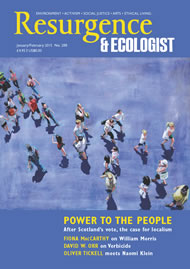These days so much fiction is written in a spare, almost anorexic prose that it’s salutary to be reminded how once, and not so long ago, there were novelists who took delight in appealing to their readers’ senses as well as to the intellect by regaling them with a feast of language. Prominent among them were two brave writers, of different generations but kindred temperament, whose imaginations travelled far beyond the current vogue for ironical scepticism in their need to articulate a vision of cosmic range. Now the Powys Society has done us a valuable service by making available in English the full, generous-hearted correspondence between Henry Miller and John Cowper Powys.
The unabashed sexual ebullience of Miller’s Tropic of Cancer and later novels has for so long been notorious that it’s hard to imagine him as the shy, would-be novelist, uncertain of his gifts, who attended the public lectures on the inseparable themes of life and literature that Powys delivered with astonishing eloquence to American audiences in the 1920s. Miller never forgot how Powys’ passionate hwyl had made his own imagination combust with visionary delight; and in later life, with his own (then scandalous) literary credentials established, he wrote to the almost-80-year-old Powys expressing his grateful admiration. The next 12 years saw a mutually affirming, life-enhancing exchange of letters between two men who rejoiced in the shared conviction that (as Powys put it) “it is wisdom in us terrestrial mortals to make what imaginative use we can of every phase of our earthly condition,” and also that “everything in life is sacred and everything is a huge jest.”
Correspondence between friends is not intended for publication, but these two daimon-driven writers are far too genial to leave the reader with any sense of intrusion, even when Miller asks his friend not to share with others the pained feelings he confesses over the breakdown of his marriage. Powys’ missives are like mighty rambles, gathering thought as they go, taking in reflections on the giants of world literature and philosophy, his peculiar sexual proclivities, his devotion to ritual, his pro-semitism, his love for the landscape around Corwen, and much else. A virile honesty is the mark of both men (even though Powys describes himself as “old-maidish”), along with a huge openness to a world that took scant note of their prolific existence.
Both writers lived their lives as matters of serious spiritual consequence, Miller drawing inspiration from Zen Buddhism, while Powys felt more kinship with the Taoist tradition, though in many ways his vision was closer to his intuitive apprehension of Druidic wisdom. Yet both are larger, more elusive figures than such generalised labelling suggests. They have their differences of perspective too. Powys challenges Miller’s advocacy of “love” – a word he considers hopelessly debased – and by countering Miller’s unitary view of things with his vision of a pluralistic “multiverse”, he anticipates (as in many passages of his magnificent novel Porius) the later insights of archetypal psychology into that imaginal polytheism which illuminates consciousness as the poetic basis of mind.
What emerges throughout, however, is the warm affection with which each of these wise old codgers recognises in the other a fellow pioneer into the vast terrain that, after the great achievements of the 19th century, still remained to be explored through fiction. Above all, the book is a timely reminder of how many of our finest writers drew their creative energy from a profound and exalted sense of the sacred and from the lived experience of the human imagination as a vital participant in larger orders of being.







